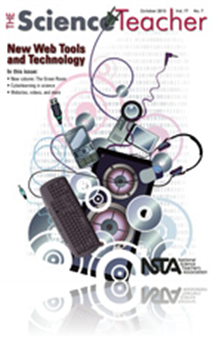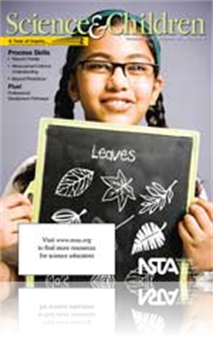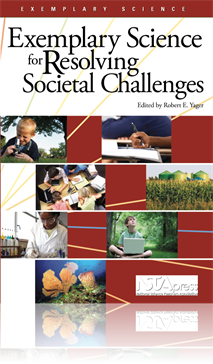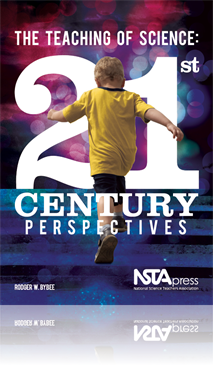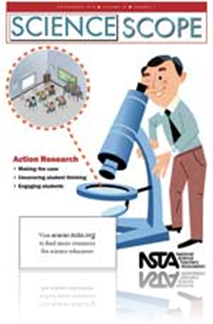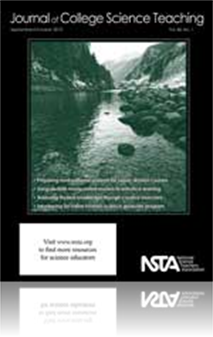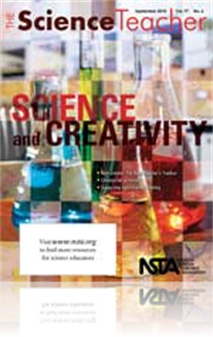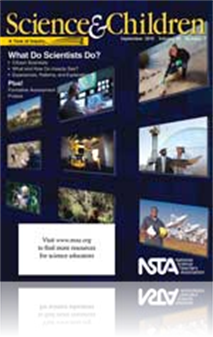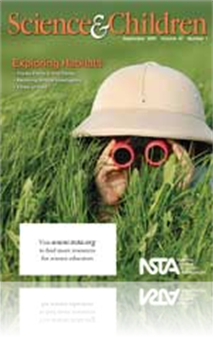All Resources
Journal Article
Last year, the author of this month’s Idea Bank had his 11th-grade physics students in Shanghai, China work with students from Chicago, Illinois. Both sets of students were given a list of questions and problems and asked to work together via Skype...
Journal Article
GENIQUEST is a cyberlearning computer program that allows students to investigate biological data using a research-based instructional model. In this article, the authors make the case for using cyberlearning to teach students about the rapidly growi...
Journal Article
Safer Science: “Chemicals of Interest” and More
In the science classroom, developing security involves more than just looking up chemicals. Securing high school science laboratories, preparation rooms, and storerooms is an integral part of protecting schools and the general public from terrorist-t...
Journal Article
Flower petals, acorn hats, exoskeletons of beetles, and lichens are just a few of the objects students may find in a surprising array of vivid colors. These tiny examples from nature’s palette can be discovered in a school yard, a park, or even alo...
Journal Article
NSTA initiated the student chapter program in 2001 to help preservice science teachers at universities and colleges gain access to professional development opportunities and provide support as they enter the profession. Here the authors share example...
NSTA Press Book
Exemplary Science for Resolving Societal Challenges
Amid a flurry of national standards and high-stakes assessments, it’s easy to overlook the curiosity and invention that is inherent to science and that should be central to any science lesson plan. Similarly, the connections between what students l...
eBook
Exemplary Science for Resolving Societal Challenges (e-book)
Amid a flurry of national standards and high-stakes assessments, it’s easy to overlook the curiosity and invention that is inherent to science and that should be central to any science lesson plan. Similarly, the connections between what students l...
Book Chapter
A Perspective on the Reform of Science Teaching
This chapter presents a perspective on reform. It begins with a brief review of the instructional core, then turns to a larger view of reform, one that includes broader questions of goals and progresses to the most fundamental area—classroom practi...
Journal Article
Scope on Safety: Negligence—Some things you can’t afford to ignore
Governmental immunity statutes may not shield science teachers from lawsuits if the teachers fail to take appropriate safety measures in the face of known hazards or dangers in the laboratory. The lesson then seems simple: Understand your “duty of ...
Journal Article
Message from the NSTA President: Imagine and Invent—Create a Great Future
The time is right for an emphasis on imagination and innovativeness in science education, both in students and in teachers. Change now dominates our economy and culture, and can only be realized through imagination and creativeness. Therefore, our ne...
Journal Article
Case Study: Using Photographs as Case Studies to Promote Active Learning in Biology
If a picture is worth a thousand words, think about how long it takes your students to read a thousand words. Case studies are effective and stimulating ways to teach a variety of subjects, including the biological sciences. In learning the details o...
Journal Article
Making the Case for Action Research
As any contemporary teacher knows, credit and credibility are showered on those who engage in research-based practices. And not just any research. It must be tied to a study with a large enough number of participants; a clear intervention; control an...
Journal Article
Supporting Right-Brained Thinking
In his book, A Whole New Mind, Daniel Pink champions the benefits of right-brained thinking: creativity, flexibility, empathy, and meaning. He stresses the need to not only be logical, but also aware of emotion; to not only be sequential, but also co...
Journal Article
Science 101: What and how do insects see?
Insect vision is both simple and complex. It’s simple in that insects can’t focus and generally see a blur. It’s complex in that insects are very good at detecting motion, they can see in almost any direction, they can use polarized ultraviolet...
Journal Article
In times of economic downturn, college enrollments often increase. Entering students may come from diverse educational backgrounds and bring variable skill sets. In this article, the authors describe a skills-focused course developed to ensure that t...
Journal Article
Career of the Month: An Interview With Audiologist Brian Fligor
Hearing is an important sense that many of us take for granted. Unless we are affected by hearing loss, we often do not think twice about listening to our favorite tunes or a neighbor’s conversation. Many things—from a viral infection to turning ...
Journal Article
Electrospinning has been used to create nanofibers for filtration devices, tissue engineering, and protective clothing. Although electrospinning is now widely studied, because of the expensive equipment required and the advanced nature of this topic,...
Journal Article
Despite years of formal education, approximately one-third of all undergraduate students still cannot explain the causes of the seasons. Student manipulation of a handheld model is one approach to teaching this concept; however, the large number of s...
Journal Article
Insect vision is an area of active research that allows fruitful exploration into the nature of the scientific endeavor because of the bias our own vision brings. As scientists, we use our senses to make observations, but we can’t assume that what ...
Journal Article
Imagine entering a new classroom and finding your lab materials in complete disarray. Broken bits of metal and shards of glass mirrors are interspersed among live, unlabeled radioactive sources. Splintered metersticks and oily beakers lie amidst bead...
Journal Article
Science 2.0: GeoEverything—The Magic Carpet
Global Positioning System receivers (GPSr) are an indispensible classroom bridge between maps and the physical world as students go back and forth between projections and Earth. When using a GPSr, the spatial-relations skills students employ can help...
Journal Article
Message from the NSTA President: Imagine and Invent—Create a Great Future
The time is right for an emphasis on imagination and innovativeness in science education, both in students and in teachers. Change now dominates our economy and culture, and can only be realized through imagination and creativeness. Therefore, our ne...
Journal Article
Everyday Engineering: An absorbing look at terry-cloth towels
This article describes a lesson where students explore the absorbency of several towels with different weaves and weights. The lesson follows the 5E learning-cycle model and incorporates engineering in the sense of product testing with a focus on the...
Journal Article
The Early Years: Inquiry at Play
Play and science inquiry are essential parts of early childhood programs. Imaginative play, unscripted yet guided by children’s own rules, allows students to use their imagination and develop self-regulation, symbolic thinking, memory, language, an...
Journal Article
Thinking Like a Ssssscientist!
A fear of snakes developed into an opportunity to teach students about the process of science: formulating questions, collecting and analyzing data, and communicating findings to the public. By using snakes to help students “think like a scientist,...
Journal Article
In this article, a science teacher from the Midwest reflects on her summer vacation to the Gulf of Mexico. She felt that this vacation would help improve her teaching about the environmental problems in the gulf and elsewhere. After all, anyone can s...
Journal Article
The Monroe 2-Orleans BOCES is an organization that serves nine school districts west of Rochester, New York. One of the many programs provided by Monroe 2-Orleans BOCES is a regional summer school program that allows students to recover credit during...
Journal Article
Formative Assessment Probes: “Doing” Science
The “Doing Science” probe from Uncovering Student Ideas in Science: Another 25 Formative Assessment Probes (Keeley, Eberle, and Dorsey 2008) can reveal some surprising ideas your students have about how scientists do their work. In order to build...
Journal Article
NSTA is breaking new ground with this month’s issue of Science Scope. For the first time, an NSTA journal is focused on action research and the role teachers play as classroom researchers. This issue chronicles the challenges and journeys teachers ...
Journal Article
Guest Editorial: A Powerful Way to Learn
If our classroom instruction is to truly reflect what scientists do, it is important to put students in situations in which they are expected to ask questions about the natural world, design investigations to answer these questions, collect data, and...
Journal Article
Idea Bank: Explaining Biological Phenomena
In this Idea Bank, the author provides two classroom activities that integrate argumentation, explanation, and the use of evidence with biology content. The first example fits within an ecology unit; the second works well in one on evolution. These e...
Journal Article
Safer Science: Shock and Awe—Peroxide Safety
What two things do diethyl ether, butadiene, diethylkatene, 2-propanol, and cyclohexene have in common? These chemicals can all be found in high school storage rooms and can all form dangerous peroxides. How dangerous are they? If the cap of an ether...
Journal Article
Method and Strategies: Supporting Ideas With Evidence
One way to help elementary students see connections more easily and to make their thinking more visible is to teach them to approach scientific investigation and problem solving as scientists do—from the framework of “finding evidence to support ...
Journal Article
The Benefits of Formative Assessments for Teaching and Learning
Formative assessments are usually informal and can range from oral question-and-answer sessions in class to performance events or quizzes. Stiggens and DuFour (2009) state that teachers and schools should use formative assessments to clarify what stu...



